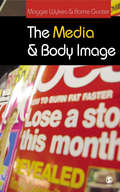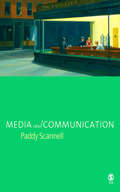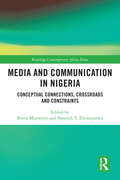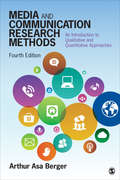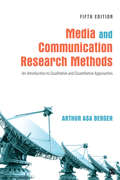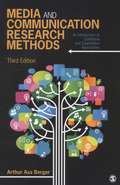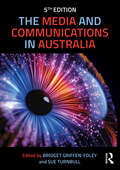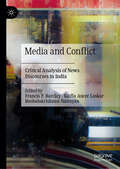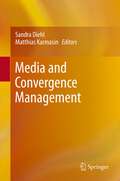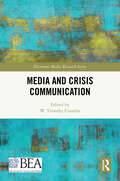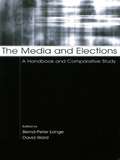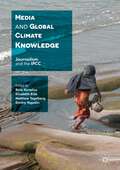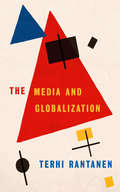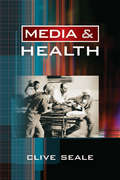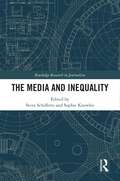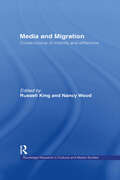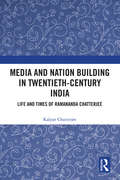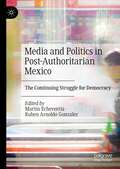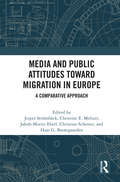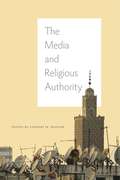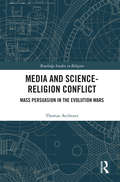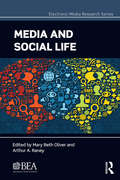- Table View
- List View
The Media and Body Image: If Looks Could Kill
by Barrie Gunter Maggie WykesBlaming the media for reproducing and extolling unrealistic female bodies has almost become a popular truism. Even medical opinion notes that the media can influence young women to starve themselves and therefore act as a possible causal factor of disordered eating. Yet surprisingly, little work has addressed either the nature of media representations of the body, or the ways in which audiences interpret and use such images in our contemporary cultural context. The Media and Body Image addresses this lack and: - Draws together literature from sociology, gender studies and psychology - Brings together new empirical work on both media representations and audience responses - Offers a broad discussion of this topic in the context of socio-cultural change, gender politics, and self-identity.
Media and Communication: A Critical Reader (Communication Ser.)
by Paddy Scannell"An excellent book providing students with a historical understanding of mass media and communication. Theories, concepts and models are intertwined throughout the chapters challenging students to critically understand and evaluate the role of mass media in society." - Stephanie Goodwin, University of Central Lancashire "In a field whose boundaries are porous and where there is no consensus as to the core concepts, theories and thinkers, Scannell brings certainty to his effort to identify key moments in the history of the study of the media and communication... Essential reading for anyone interested in the historical development of the study of the media in the US and the UK." - Times Higher Education "His account of these major writers and movements is both comprehensive and clearly written, and will be appreciated by students and academics alike... It is the detail of the historical contexts that makes his writing a refreshing look at the history of media and communication in the twentieth century." - Media International Australia Magisterial in scope, Media and Communication traces the historical development of media and communication studies. Media Studies itself has a short history but many antecedents, and in this comprehensive and compelling book, Paddy Scannell sets out to describe and analysize its formulation in North America and Europe. Media and Communication: Offers an accessible and comprehensive analysis of the development of media and communication theory. Includes a summary outline of all the key thinkers. Looks at the study of communication across a range of disciplines - history, literature, sociology, philosophy and linguistics. Challenges readers to engage with the central importance of communication. It will be an invaluable resource for upper level undergraduate and postgraduate students of media and communication, cultural studies and sociology.
Media and Communication in Nigeria: Conceptual Connections, Crossroads and Constraints (Routledge Contemporary Africa)
by Bruce Mutsvairo and Nnamdi T. EkeanyanwuCommunication is changing rapidly around the world, particularly in Africa, where citizens are embracing digital technologies not only to improve not only interpersonal communication but also the state of their financial well-being. This book investigates these transformations in Nigeria’s booming communication industry. The book traces communications in Nigeria back to pre-colonial indigenous communications, through the development of telecommunication, broadcasting networks, the press, the Nigerian film industry (‘Nollywood’) and on to the digital era. At a time when Western voices still dominate the academic literature on communication in Africa, this book is noteworthy in drawing almost exclusively on the expertise of Nigerian-based authors, critiquing the discipline from their own lens and providing an important contribution to the decolonisation of communication studies. The authors provide a holistic analysis of the sector, encompassing print journalism, broadcast journalism, public relations, advertising, film, development communication, organisational communication and strategic communication. Analysis of the role of digital technologies is woven throughout the book, concluding with a final section theorising the future of communication studies in Nigeria in the light of the digital media revolution. Robust in its theoretical and methodological underpinnings, this book will be an important reference for researchers of media and communication studies, and those working on Africa specifically.
Media and Communication Research Methods: An Introduction to Qualitative and Quantitative Approaches
by Dr Berger Arthur AMedia and Communication Research Methods, Fourth Edition is a concise and practical text designed to give students a step-by-step introduction to conducting media and communication research. Offering real-world insights along with the author’s signature animated style, this text makes the discussion of complex qualitative and quantitative methods easy to comprehend. Packed with detailed examples and practical exercises, the Fourth Edition of this bestselling introductory text includes a new chapter on discourse analysis; expanded discussion of social media, expanded coverage of the research process, and more. Ideal for undergraduate and graduate students conducting research for the first time, this accessible text will help students understand, practice, and master media and communication research.
Media and Communication Research Methods: An Introduction to Qualitative and Quantitative Approaches
by Dr Berger Arthur AMedia and Communication Research Methods, Fourth Edition is a concise and practical text designed to give students a step-by-step introduction to conducting media and communication research. Offering real-world insights along with the author’s signature animated style, this text makes the discussion of complex qualitative and quantitative methods easy to comprehend. Packed with detailed examples and practical exercises, the Fourth Edition of this bestselling introductory text includes a new chapter on discourse analysis; expanded discussion of social media, expanded coverage of the research process, and more. Ideal for undergraduate and graduate students conducting research for the first time, this accessible text will help students understand, practice, and master media and communication research.
Media and Communication Research Methods: An Introduction to Qualitative and Quantitative Approaches
by Dr Berger Arthur AThis step-by-step introduction to conducting media and communication research offers practical insights along with Arthur Asa Berger’s signature lighthearted style to make discussion of qualitative and quantitative methods easy to comprehend. The Fifth Edition of Media and Communication Research Methods includes a new chapter on discourse analysis; expanded discussion of social media, including discussion of the ethics of Facebook experiments; and expanded coverage of the research process with new discussion of search strategies and best practices for analyzing research articles. Ideal for research students at both the graduate and undergraduate level, this proven book is clear, concise, and accompanied by just the right number of detailed examples, useful applications, and valuable exercises to help students to understand, and master, media and communication research.
Media and Communication Research Methods: An Introduction to Qualitative and Quantitative Approaches
by Dr Berger Arthur AThis step-by-step introduction to conducting media and communication research offers practical insights along with Arthur Asa Berger’s signature lighthearted style to make discussion of qualitative and quantitative methods easy to comprehend. The Fifth Edition of Media and Communication Research Methods includes a new chapter on discourse analysis; expanded discussion of social media, including discussion of the ethics of Facebook experiments; and expanded coverage of the research process with new discussion of search strategies and best practices for analyzing research articles. Ideal for research students at both the graduate and undergraduate level, this proven book is clear, concise, and accompanied by just the right number of detailed examples, useful applications, and valuable exercises to help students to understand, and master, media and communication research.
Media and Communication Research Methods: An Introduction to Qualitative and Quantitative Approaches 3rd edition
by Arthur Asa BergerThe new edition combines insightful discussions of qualitative and quantitative media and communication research methods as it covers each topic thoroughly in a fun-to-read style. Ideal for beginning research students at both the graduate and undergraduate level, this proven book is clear, concise, and accompanied by just the right number of detailed examples, useful applications, and valuable exercises that are sure to get your students to want to understand, and master, media and communication research.
The Media and Communications in Australia
by Bridget Griffen-Foley Sue TurnbullAt a time when the traditional media have been reshaped by digital technologies and audiences have fragmented, people are using mediated forms of communication to manage all aspects of their daily lives as well as for news and entertainment. The Media and Communications in Australia offers a systematic introduction to this dynamic field. Fully updated and expanded, this fifth edition outlines the key media industries – from print, sound and television to film, gaming and public relations – and explains how communications technologies have changed the ways in which they now operate. It offers an overview of the key approaches to the field, including a consideration of Indigenous communication, and features a ‘hot topics’ section with contributions on issues including diversity, misinformation, algorithms, COVID-19, web series and national security. With chapters from Australia’s leading researchers and teachers in the field, The Media and Communications in Australia remains the most comprehensive and reliable introduction to media and communications from an Australian perspective. It is an ideal student text and a key resource for teachers, lecturers, media practitioners and anyone interested in understanding these influential industries.
Media and Conflict: Critical Analysis of News Discourses in India
by Francis P. Barclay Kaifia Ancer Laskar Boobalakrishnan NatrayanThis book integrates critical studies of conflict news discourses and social media exchanges in India to discuss their underlying sociopolitical and economic ideologies and powerplays. Using several theoretical frameworks to investigate how assorted Indian conflicts are presented in the mediascape, the book aims to educate and empower audiences—and inspire the next generation of journalists to be constructively critical, ethical and peace-conscious.
Media and Convergence Management
by Sandra Diehl Matthias KarmasinConvergence has gained an enormous amount of attention in media studies within the last several years. It is used to describe the merging of formerly distinct functions, markets and fields of application, which has changed the way companies operate and consumers perceive and process media content. These transformations have not only led business practices to change and required companies to adapt to new conditions, they also continue to have a lasting impact on research in this area. This book's main purpose is to shed some light on crucial phenomena of media and convergence management, while also addressing more specific issues brought about by innovations related to media, technologies, industries, business models, consumer behavior and content management. This book gathers insights from renowned academic researchers and pursues a highly interdisciplinary approach. It will serve as a valuable reference guide for students, practitioners and researchers interested in media convergence processes.
Media and Crisis Communication (Electronic Media Research Series)
by W. Timothy CoombsThis volume centers on the relationship between media and crisis communication, the need to address which has only been heightened by the recent experience of COVID-19 and the needs for public health crisis communication.With multiple voices and multiple fields engaging simultaneously with crisis communication, this book illuminates the role of media in crisis communication within this complex environment. Both traditional and digital media, including social media platforms, respond to an array of crisis contexts including political crises, public health crises, disasters, and organizational crises. The book presents original research that approaches the effects of media in any of the possible crisis contexts.This collection will interest scholars and students of crisis communication, public relations, risk communication, digital media, and political communication.
The Media and Elections: A Handbook and Comparative Study (European Institute for the Media Series)
by Bernd-Peter Lange David WardThis comparative study brings together academics and practitioners who work in the field of media and elections to provide a set of national case studies and an analysis of the legal and regulatory frameworks that are employed by nation states to ensure that the media perform according to certain standards during election periods. In setting out the legal and regulatory framework each chapter provides an account of the socio-political conditions and media environment in each of the countries and subsequently details the laws that govern the print and broadcast media during election campaign periods. The countries included are France, Germany, Italy, Russia, South Africa, the United States, and the United Kingdom. A set of reflections by a Member of the European Parliament and a set of recommendations for good practice in media and elections are also included. Thus, the book is organized to provide a practical guide so that it can be used as a handbook.
Media and Global Climate Knowledge: Journalism and the IPCC
by Risto Kunelius Elisabeth Eide Matthew Tegelberg Dmitry YagodinThis book is a broad and detailed case study of how journalists in more than 20 countries worldwide covered the Intergovernmental Panel on Climate Change (IPCC) Fifth Assessment (AR5) reports on the state of scientific knowledge relevant to climate change. Journalism, it demonstrates, is a key element in the transnational communication infrastructure of climate politics. It examines variations of coverage in different countries and locations all over the world. It looks at how IPCC scientists review the role of media, reflects on how media relate to decision-making structures and cultures, analyzes how key journalists reflect on the challenges of covering climate change, and shows how the message of IPCC was distributed in the global networks of social media.
The Media and Globalization
by Terhi Rantanen`This is a necessary and very original book that really does address the lack of attention to media in previous discussions about globalization' - James Lull, San Jose State University There is practically no globalization without media and communications. Yet this relationship is so obvious it is often overlooked. Rantanen challenges conventional ways of thinking about globalization and shows it cannot be understood without studying the role of the media. This book offers: - a clear and accessible overview of globalization and the pivotal role of the media - an introduction to the concepts and theories of globalization - empirical data on the production and consumption of media - a methodology for relating individual, local experiences to the global picture Rantanen has made this complex and huge subject very accessible by using personal histories and pictures to engage the reader. It will be invaluable to students in international media, cultural studies, communications and international relations.
Media and Health (Sociology Of Health And Illness Monographs)
by Clive Seale`This book appears to fill a substantial gap in the literature at present. There are, quite simply, no books available which engage seriously and competently with the presentation of health issues in the media, and certainly none which focuses on representations of health and illness in as thematically coherent a manner as Seale proposes to do' - Richard Gwyn, University of Cardiff `This is an excellent resource for students. It provides a comprehensive review of secondary literature in the field and is very well researched. Students of sociology of health and illness and in media and communication studies will find the book invaluable' - David Oswell, Goldsmiths College, University of London `This is a comprehensive work on media health, providing an invaluable "toolkit" for understanding health and the media in contemporary society. Seale goes further than previous textbooks, critiquing the "lament" of media health promoters in order to explore the moralisation and commercialisation of media health' - Dr Annette Hill, University of Westminster How are health matters presented by the mass media? How accurate are the messages we are receiving? This book demonstrates how health messages in popular mass media are important influences in our lives, and that they are not neutral, being subject to many determining influences. It demonstrates the importance of mass media for understanding the experience of illness, health and health care, bringing together the latest thinking in the field of media studies and the sociology of health and illness. This book provides a thorough review of research literature on media representations of health, illness and health care, covering their production, characteristic forms and relationships with the everyday lives of media audiences. It brings together both well known and lesser-known studies in the context of an integrated, sociological argument about media and health. Media producers are subject to a variety of influences, from medical lobbies, scientific organizations, and not least the commercial pressure to satisfy media-saturated audiences. These mean that aims of health promoters are not always easily achieved, leading to considerable tensions that require a deeper understanding of media health than has hitherto been applied to them. This book will be essential reading for health educators and promoters, as well as health care providers interested in the cultural aspects of health, sociologists of health and illness, and students and academics of media studies.
The Media and Inequality (Routledge Research in Journalism)
by Steve Schifferes Sophie KnowlesThis book brings together a vast range of pre-eminent experts, academics, and practitioners to interrogate the role of media in representing economic inequality. It explores and deconstructs the concept of economic inequality by examining the different dimensions of inequality and how it has evolved historically; how it has been represented and portrayed in the media; and how, in turn, those representations have informed the public’s knowledge of and attitudes towards poverty, class and welfare, and political discourse. Taking a multi-disciplinary, comparative, and historical approach, and using a variety of new and original data sets to inform the research, studies herein examine the relationship between media and inequality in UK, Western Europe, and USA. In addition to generating new knowledge and research agendas, the book generates suggestions of ways to improve news coverage on this topic and raise the level of the debate, and will improve understanding about economic inequality, as it has evolved, and as it continues to develop in academic, political and media discourses. This book will be of interest to academics and practitioners alike in the areas of journalism, media studies, economics, and the social sciences, as well as political commentators and those interested more broadly in social policy.
Media and Migration: Constructions of Mobility and Difference (Routledge Research in Cultural and Media Studies #Vol. 8)
by Nancy Wood Russell KingThis title explores the close and vital relationship between the contemporary media and immigration. Drawing on newspapers, magazines, film, television and photography, the contributors examine the effects of mass media on migration behaviour and ethnic identity. Using examples from a range of countries, Media and Migration illustrates how the media intervenes to affect the reception migrants receive, how it stimulates prospective migrants to move and how it plays a dynamic role in the cultural politics and cultural identity of diasporic communities.
Media and Nation Building in Twentieth-Century India: Life and Times of Ramananda Chatterjee
by Kalyan ChatterjeeThis book profiles twentieth-century India through the life and times of Ramananda Chatterjee – journalist, influencer, nationalist. Through a reconstruction of his history, the book highlights the oft-forgotten role of media in the making of the idea of India. It shows how early twentieth-century colonial India was a curious melee of ideas and people – a time of rising nationalism, as well as an influx of Western ideas; of unprecedented violence and compelling non-violence; of press censorship and defiant journalism. It shows how Ramananda Chatterjee navigated this world and went beyond the traditional definition of the nation as an entity with fixed boundaries to anticipate Benedict Anderson and Ernest Gellner. The volume also examines the wide reach and scope of his journals in English, Hindi and Bengali, which published the likes of Rabindranath Tagore, Subhash Bose, Abanindranath Tagore, Nandalal Bose, Ananda Coomaraswamy, the scientist J. C. Bose and Zhu Deh, the co-founder of the Chinese Red Army. He also published India in Bondage by the American Unitarian minister J. T. Sunderland, which resulted in his arrest. An intriguing behind-the-scenes look of early twentieth-century colonial India, this book will be of great interest to scholars and researchers of history, modern South Asia and media and cultural studies.
Media and Politics in Post-Authoritarian Mexico: The Continuing Struggle for Democracy
by Martin Echeverria Ruben Arnoldo GonzalezThis volume presents an analytical and empirical overview of the array of issues that the Mexican media faces in the post-authoritarian age, which jointly explains how a partially accomplished democracy, its authoritarian inertias, and its unintended consequences hinder the democratic performance of the media. This is analyzed from three points of view: the stalemate Mexican media system and ineffective regulations, the conditions of risk and insecurity of the journalists on the field, and the limits of freedom of expression, political substance, and inclusiveness of media content. A binational effort, with research from US and Mexican authors, a wide analytic perspective is provided on the macro, meso, and micro levels, allowing for a deep conceptual richness and a comprehensive understanding of the Mexican case. With leading researchers in the field, the volume revolves around the problems of the media in post-authoritarian democracies. By answering the questions of how and why the Mexican media has not fully democratized, the works encompassed here can resonate with and are relevant to other post-authoritarian countries and academic disciplines.
Media and Print Culture Consumption in Nineteenth-Century Britain
by Paul Raphael Rooney Anna GasperiniThis book explores Victorian readers' consumption of a wide array of reading matter. Established scholars and emerging researchers examine nineteenth-century audience encounters with print culture material such as periodicals, books in series, cheap serials, and broadside ballads. Two key strands of enquiry run through the volume. First, these studies of historical readership during the Victorian period look to recover the motivations or desired returns that underpinned these audiences' engagement with this reading matter. Second, contributors investigate how nineteenth-century reading and consumption of print was framed and/or shaped by contemporaneous engagement with content disseminated in other media like advertising, the stage, exhibitions, and oral culture.
Media and Public Attitudes Toward Migration in Europe: A Comparative Approach
by Jesper Strömbäck, Christine E. Meltzer, Jakob- Moritz Eberl, Christian Schemer, and Hajo G. BoomgaardenThis comparative volume provides a comprehensive cross-national account of media coverage and public attitudes toward migration both within and into the European Union. Using empirical research from across Germany, Hunary, Poland, Spain, Sweden, and the United Kingdom, Media and Public Attitudes Toward Migration in Europe offers an in-depth exploration of one of the most prominent social and political topics of the decade in Europe. Drawing on a large scale, cross-national panel survey, experiments, and media content analysis of migration discourse in both traditional news media and social media, expert contributors from across the continent investigate topics such as the linguistic features of migration coverage, the public perception of migrants, and the effects of journalistic communication strategies. Other topics addressed include a discussion of news framing effects on migration coverage and politicians’ postings on social media coverage about the issue. This is a valuable resource for academics, students, and policymakers interested in media coverage of migration, news framing effects, and public attitudes to migration generally..
The Media and Religious Authority
by Stewart M. HooverAs the availability and use of media platforms continue to expand, the cultural visibility of religion is on the rise, leading to questions about religious authority: Where does it come from? How is it established? What might be changing it? The contributors to The Media and Religious Authority examine the ways in which new centers of power and influence are emerging as religions seek to “brand” themselves in the media age. Putting their in-depth, incisive studies of particular instances of media production and reception in Asia, Africa, Latin America, and North America into conversation with one another, the volume explores how evolving mediations of religion in various places affect the prospects, aspirations, and durability of religious authority across the globe.An insightful combination of theoretical groundwork and individual case studies, The Media and Religious Authority invites us to rethink the relationships among the media, religion, and culture.The contributors are Karina Kosicki Bellotti, Alexandra Boutros, Pauline Hope Cheong, Peter Horsfield, Christine Hoff Kraemer, Joonseong Lee, Alf Linderman, Bahíyyah Maroon, Montré Aza Missouri, and Emily Zeamer, with an afterword by Lynn Schofield Clark.
Media and Science-Religion Conflict: Mass Persuasion in the Evolution Wars (Routledge Studies in Religion)
by Thomas AechtnerThis book examines why the religion-science skirmishes known as the Evolution Wars have persisted into the 21st century. It does so by considering the influences of mass media in relation to decision-making research and the Elaboration Likelihood Model, one of the most authoritative persuasion theories. The book’s analysis concentrates on the expression of cues, or cognitive mental shortcuts, in Darwin-sceptic and counter-creationist broadcasts. A multiyear collection of media generated by the most prominent Darwin-sceptic organizations is surveyed, along with rival publications from supporters of evolutionary theory described as the pro-evolutionists. The analysed materials include works produced by Young Earth Creationist and Intelligent Design media makers, New Atheist pacesetters, as well as both agnostic and religious supporters of evolution. These cues are shown to function as subtle but effective means of shaping public opinion, including appeals to expertise, claims that ideas are being censored, and the tactical use of statistics and technical jargon. Contending that persuasive mass media is a decisive component of science-religion controversies, this book will be of keen interest to scholars of Religion, Science and Religion interactions, as well as researchers of Media and Communication Studies more generally.
Media and Social Life (Electronic Media Research Series)
by Mary Beth Oliver Arthur A. RaneyOur use of media touches on almost all aspects of our social lives, be they friendships, parent-child relationships, emotional lives, or social stereotypes. How we understand ourselves and others is now largely dependent on how we perceive ourselves and others in media, how we interact with one another through mediated channels, and how we share, construct, and understand social issues via our mediated lives. This volume highlights cutting edge scholarship from preeminent scholars in media psychology that examines how media intersect with our social lives in three broad areas: media and the self; media and relationships; and social life in emerging media. The scholars in this volume not only provide insightful and up-to-date examinations of theorizing and research that informs our current understanding of the role of media in our social lives, but they also detail provocative and valuable roadmaps that will form that basis of future scholarship in this crucially important and rapidly evolving media landscape.
